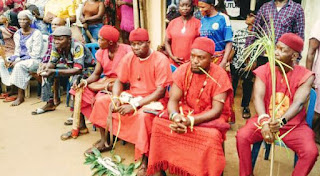Delta State is at war—not with a foreign invader, but with fear, silence, and the creeping menace of unchecked criminality.
From the farmlands of Abraka to the sacred shrines of Ibusa, from the schools of Agbarho to the ancestral homesteads of Issele-Uku, Ogwashi-Uku, and Ibulu-Uku, the people of Delta are confronting a grim reality: peace is under siege. Killings, kidnappings, armed robbery, herdsmen attacks, and the mysterious disappearance of children have become alarmingly frequent.
A String of Tragedies Across Delta
In Abraka, once known for its serene rivers and vibrant academic life, the air is thick with grief and anxiety. Families have been abducted in broad daylight while tending their farms—abductions that end in ransoms, trauma, or worse. In one recent case, a family on a routine farmland visit was seized by gunmen and held hostage for days.
In Agbarho, children are disappearing—some never return. Parents now live in dread. Streets are quiet, schools less populated. No one knows who is next.
Ogwashi-Uku, the administrative seat of Aniocha South, has recorded a wave of kidnappings in recent months. Traders and students have been seized. In some cases, ransom demands are made. In others, silence follows. These criminals move with impunity, leaving a trail of psychological scars.
Ibulu-Uku, another once-tranquil town, has not been spared either. Locals whisper about missing farmers, intercepted travelers, and homes left abandoned as families flee for safety. This is no longer a rural issue; it is a state-wide crisis.
When the State Staggers, Communities Must Rise
In the face of this terror, some communities are refusing to be victims.
The people of Ibusa did not retreat—they rose. In a sacred ritual known as Isu-Ofor, Ibusa unleashed the power of its ancestors. Villagers armed not with weapons, but with palm fronds, Bibles, charms, and chants, gathered at the Ihu-Ani Igbuzo shrine, invoking divine justice upon kidnappers, ritualists, armed robbers, and their enablers.
High Chiefs and elders led the way. Women prayed. Youth marched. And the Chief Priest of Ibusa declared boldly: “We will not surrender our land to criminals.” Ibusa reminded Delta State that in the absence of justice, tradition can serve as both shield and sword.
In Issele-Uku, ancient surveillance networks and sacred oaths are being revived. Here, crime is not only punished physically—it is cursed spiritually.
These are not mere ceremonies—they are calls to conscience. They are symbolic declarations that say: We will not wait to be rescued. We will fight for our peace.
The Delta State Security Corps Bill: A Chance to Reclaim Control
Thankfully, the Delta State House of Assembly has passed the Community Security Corps Agency Bill, a legislative attempt to legalize and institutionalize community-based security. This is a major opportunity—but only if acted upon immediately.
This bill can become the backbone of localized, trained, and accountable security networks drawn from within the communities themselves. It envisions:
- Recruitment of local vigilantes, hunters, and neighborhood guards.
- Collaboration with traditional rulers and community chiefs.
- Legal backing for grassroots intelligence and rapid response.
But a law without action, without funding, and without political will, is just a piece of paper.
Everyone Has a Role. Everyone Has a Stake.
The fight against insecurity cannot be left to the government alone. We call on all stakeholders:
- Traditional rulers, like those in Ibusa and Issele-Uku, to stand as cultural sentinels and moral anchors.
- Community Development Unions in places like Ogwashi-Uku and Ibulu-Uku to fund local watch groups and security infrastructure.
- Youth leaders to organize patrols, tip-off networks, and block watch systems.
- Faith institutions to preach not only peace, but protection and vigilance.
- Delta State Government to immediately activate and finance the Security Corps Agency.
- Governor Sheriff Oborevwori, to prioritize this bill and launch an emergency statewide security summit.
What’s at Stake? Everything.
Without immediate action:
- Farmers will abandon their lands.
- Local economies will crumble.
- Children will grow up in fear.
- And communities may turn to self-help justice—a dangerous road that could spiral into chaos.
A Final Word: The Spirit of Delta Must Rise Again
If Ibusa can defend its land, so can Ogwashi-Uku. If Issele-Uku can trust its ancestors to protect the innocent, so can Ibulu-Uku. If the people of Agbarho can raise their voices for their children, then the entire Delta must listen.
Let this be our rallying cry:
We will not run. We will not surrender. We will defend our land. Together. Boldly. Now.



